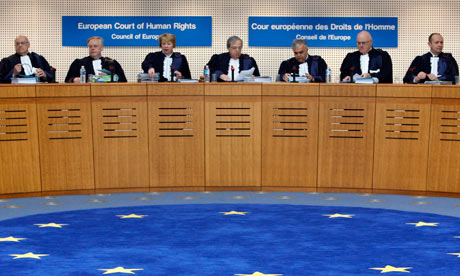Critics of the European court are on the wrong side of history – the UK needs an international standard on human rights
Geraldine Van Bueren
guardian.co.uk, Monday 21 February 2011 13.29 GMT

The European court of human rights 'has overwhelmingly upheld the majority of decisions made by the UK parliament and courts'. Photograph: Vincent Kessler/REUTERS
Throughout history, those who hold the reins of power have frequently derided charters of rights and the courts that enforce them. The Magna Carta was not welcomed by King John: as well as seeking to resist the great charter, he even secretly asked Pope Innocent III to annul it.
More than 400 years later, the Magna Carta, celebrated by modern British governments of all political persuasions, was considered so unacceptable by King Charles I that chief justice Edward Coke's analysis of it was suppressed for almost a decade after Coke's death. Now, despite Britain's founding role in the European convention on human rights, there appears to be a campaign to scapegoat human rights and to repudiate our proud history.
First there was an attack on the European convention over prisoners' right to vote, asserting that we should withdraw from the convention because we could trust our supreme court. A week later, the government backflipped to tell us that not only could we not trust the European court of human rights, but that we also could not rely on British judges in the supreme court. This comes dangerously close to undermining our rule of law. Coke, who in 1607 ruled that only the courts could decide legal cases, defended the rule of law – a British principle which has since been upheld by Strasbourg.
It is inherent in the nature of human rights that as society becomes more humane and compassionate, there is a need to develop rights so that society can continue to progress. Today's controversy becomes tomorrow's proud recognition of our human rights. Hence it was the courts, and not parliament, which ruled that "the air of England is too pure for any slave to breathe". Parliamentarians did not universally embrace Lord Mansfield's 1772 judgment, and it took parliament more than 30 years to abolish the slave trade.
The Somersett case was a major British contribution to article 4 of the European convention on human rights, prohibiting slavery and servitude. The European court interpreted this to prohibit the trafficking of 15-year-old girls into domestic servitude. This is what the court means by "a living instrument": applying universally held fundamental principles to present-day conditions. Why would we want to oppose such a common sense and practical approach?
A rich and informed debate is a sign of a vibrant democracy, but the current tone and predominance of misleading information appears closer to hysteria. Amid this outrage, it's worth bearing a few things in mind. First, the European court has overwhelmingly upheld the majority of decisions made by parliament and the courts. Second, the European court has also been used by governments of all political persuasions as a shield from criticism within their own ranks, for example by blaming the court when they do what they know they should have done, such as stopping the ban on gay people in the military.
Third, there has been no compensation, nor will there be compensation in the future for prisoners who could not vote. Strasbourg did not order compensation in either of the two British cases. The only payment was for legal costs which the UK government, as loser, paid, just as it would have paid in British courts.
Attacking judges because they are foreign ignores the fact that some of our most distinguished judges were born and legally educated overseas, including Lord Cooke, who sat as a judge in New Zealand before becoming a member of the British House of Lords, and Lord Steyn, who is from South Africa. There is no court in the world that has a 100% approval ratings of its judgments by everyone in the country. However it is reckless leap to conclude from this that the UK ought to withdraw from the European convention.
If Britain were to withdraw from the ECHR, or even just to rebalance the relationship between national courts and the European court, it would become the first country in Europe to do so. The ramifications of this would be immense. It would also irreparably damage our reputation as a supporter of democracy and human rights globally.
When Britain takes over the chairmanship of the Council of Europe in November, the government should focus on constructively helping the European court of human rights to deal with its huge caseload, rather than weakening its authority.

No comments:
Post a Comment